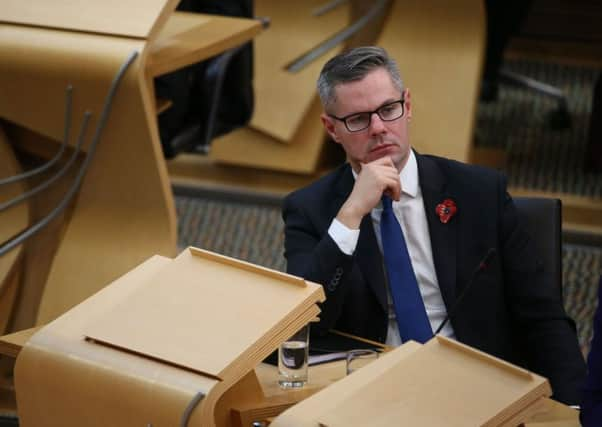Tories call on Mackay to avoid wider tax gap in budget


Mackay raised eyebrows last week when he hinted that there is still scope to tax higher earners more north of the border, despite concerns from business leaders over the impact on the economy and key professions.
He has been under pressure over the issue in recent months since Chancellor Philip Hammond unveiled plans in his budget for 2019/20 to provide middle earners with an effective tax cut by extending the threshold at which they start paying the “higher” 40 pence rate to £50,000 – compared with £43,430 in Scotland.
Advertisement
Hide AdAdvertisement
Hide AdEven if Mackay decides to raise this by inflation to £44,470, it would still mean an average Scot in the higher tax band would be left with a bill of £1,350.
Perhaps the more substantial issue is the impact on economic growth as Scotland’s tax base will have a direct impact on public spending in 2019/20 as the post-Smith Commission “safety net” is removed. If the public spending raised through devolved taxes such as income tax, Land and Buildings Transaction Tax (LBTT) and landfill tax falls short, the Scottish exchequer loses out.
Mackay has been meeting with opposition parties in recent weeks as he seeks to do a deal, but a demand for local government tax reform from his usual budget partners, the Greens, has so far thwarted an agreement. Labour and the Liberal Democrats both want steeper tax hikes, which could prove problematic, while the Tories’ call for a second independence referendum to be dropped rules out a deal with Ruth Davidson’s party.
As the pressure builds on Mackay over tax, Tory finance spokesman Murdo Fraser said it is time to focus on growth.
“We’ve asked them to commit to no widening of the income tax differential between us and the rest of the UK at the very least,” he said.
“We would like to see it closed, but politics is the art of the possible, so at the minimum: no widening.”
SNP strategists feel the popularity of policies such as free university education, free prescriptions and free personal care for the elderly, as well as lower water and council tax charges, has resulted in a broader acceptance among middle-class Scots of the case for modest tax hikes.
But it remains contentious and was raised with Education Secretary John Swinney as he appeared at a School Leaders Scotland conference a fortnight ago, with a warning that the tax gap was discouraging qualified teachers from applying for promoted positions because so much of their additional salary would go on tax.
Advertisement
Hide AdAdvertisement
Hide Ad“This is a process and, as devolved income tax become more understood and more part of the political climate and there becomes a broader political debate around tax rates and their impact both on the economy and public services, I think we’ll see people becoming more concerned about it,” Fraser added.
The Scottish Government overhauled the income tax system for 2018/19 after control over rates and bands was devolved to Holyrood. It saw the creation of five bands, including the new starter and intermediate rates.
The Chancellor’s changes for next year will mean higher earners pay significantly more in Scotland than elsewhere in the UK. Even if the Scottish income tax bands only move with inflation, workers making £50,000 north of the border face a tax bill £1,300 higher than their UK counterparts from April.
The Scottish Government has already seen £700 million added to its budget of about £33 billion in 2019/20 as a result of so-called Barnett consequentials – extra cash from Westminster – unveiled last year. But a gloomy outlook for the country’s tax base saw these revised down by £400m last year by the Scottish Fiscal Commission.
This did not affect public spending last year, but it will next year as the Westminster “safety net” is withdrawn. The situation will become clear when the Commission unveils its forecasts on Wednesday.
Fraser added: “We could be in a position where Derek Mackay has been given all this extra money from the UK government, but that additional sum is reduced because the fiscal commission downgrades their forecasts for income tax receipts within Scotland, which would politically send a very strong message that it’s Scotland’s economic underperformance which is adversely affecting the amount of money we have to spend on the public finances.
“By focusing on economic growth and improving productivity you can deliver more money for the public services without having to increase tax rates.”
The SNP has accused the Tories of “trying to con” voters with unaffordable tax cuts. The party cites analysis by the think tank IPPR Scotland which shows that bringing Scotland into line with the tax regime in the rest of the UK would cut revenue by £1bn in the next four years.
Advertisement
Hide AdAdvertisement
Hide AdSNP MSP Angela Constance said: “The Tories are trying to con voters by promising extra spending while handing high earners a tax cut – it just doesn’t add up.”
Mackay vowed to protect “vital public services” and prioritise spending on health and education. He said: “Our policies have already ensured that Scotland benefits from quality public services and our progressive reforms to income tax have protected those on the lowest incomes.”
While he cited Brexit as continuing to be the “biggest threat to Scotland’s prosperity”, he insisted his proposals would “not be defined” by this.
Instead, he said the Budget “will set out how we help protect Scotland as far as we can from the damaging uncertainty of the UK government’s Brexit policy”.